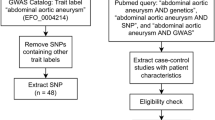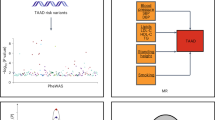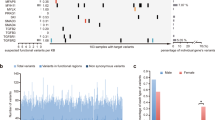Abstract
Abdominal aortic aneurysm (AAA) is a multifactorial condition. The transforming growth factor β (TGF-β) pathway regulates vascular remodeling and mutations in its receptor genes, TGFBR1 and TGFBR2, cause syndromes with thoracic aortic aneurysm (TAA). The TGF-β pathway may be involved in aneurysm development in general. We performed an association study by analyzing all the common genetic variants in TGFBR1 and TGFBR2 using tag single nucleotide polymorphisms (SNPs) in a Dutch AAA case–control population in a two-stage genotyping approach. In stage 1, analyzing 376 cases and 648 controls, three of the four TGFBR1 SNPs and nine of the 28 TGFBR2 SNPs had a P<0.07. Genotyping of these SNPs in an independent cohort of 360 cases and 376 controls in stage 2 confirmed association (P<0.05) for the same allele of one SNP in TGFBR1 and two SNPs in TGFBR2. Joint analysis of the 736 cases and 1024 controls showed statistically significant associations of these SNPs, which sustained after proper correction for multiple testing (TGFBR1 rs1626340 OR 1.32 95% CI 1.11–1.56 P=0.001 and TGFBR2 rs1036095 OR 1.32 95% CI 1.12–1.54 P=0.001 and rs4522809 OR 1.28 95% CI 1.12–1.46 P=0.0004). We conclude that genetic variations in TGFBR1 and TGFBR2 associate with AAA in the Dutch population. This suggests that AAA may develop partly by similar defects as TAA, which in the future may provide novel therapeutic options.
Similar content being viewed by others
Log in or create a free account to read this content
Gain free access to this article, as well as selected content from this journal and more on nature.com
or
References
Sakalihasan N, Limet R, Defawe OD : Abdominal aortic aneurysm. Lancet 2005; 365: 1577–1589.
Cornuz J, Sidoti PC, Tevaearai H, Egger M : Risk factors for asymptomatic abdominal aortic aneurysm: systematic review and meta-analysis of population-based screening studies. Eur J Public Health 2004; 14: 343–349.
Sandford RM, Bown MJ, London NJ, Sayers RD : The genetic basis of abdominal aortic aneurysms: a review. Eur J Vasc Endovasc Surg 2007; 33: 381–390.
Annambhotla S, Bourgeois S, Wang X, Lin PH, Yao Q, Chen C : Recent advances in molecular mechanisms of abdominal aortic aneurysm formation. World J Surg 2008; 32: 976–986.
The UK Small Aneurysm Trial Participants: Mortality results for randomised controlled trial of early elective surgery or ultrasonographic surveillance for small abdominal aortic aneurysms. Lancet 1998; 352: 1649–1655.
Jones GT, Phillips VL, Harris EL, Rossaak JI, van Rij AM : Functional matrix metalloproteinase-9 polymorphism (C-1562T) associated with abdominal aortic aneurysm. J Vasc Surg 2003; 38: 1363–1367.
Ogata T, Shibamura H, Tromp G et al: Genetic analysis of polymorphisms in biologically relevant candidate genes in patients with abdominal aortic aneurysms. J Vasc Surg 2005; 41: 1036–1042.
Smallwood L, Allcock R, van Bockxmeer F et al: Polymorphisms of the matrix metalloproteinase 9 gene and abdominal aortic aneurysm. Br J Surg 2008; 95: 1239–1244.
Armani C, Curcio M, Barsotti MC et al: Polymorphic analysis of the matrix metalloproteinase-9 gene and susceptibility to sporadic abdominal aortic aneurysm. Biomed Pharmacother 2007; 61: 268–271.
Helgadottir A, Thorleifsson G, Magnusson KP et al: The same sequence variant on 9p21 associates with myocardial infarction, abdominal aortic aneurysm and intracranial aneurysm. Nat Genet 2008; 40: 217–224.
Thompson AR, Golledge J, Cooper JA, Hafez H, Norman PE, Humphries SE : Sequence variant on 9p21 is associated with the presence of abdominal aortic aneurysm disease but does not have an impact on aneurysmal expansion. Eur J Hum Genet 2008; Oct 15.
Jones JA, Spinale FG, Ikonomidis JS : Transforming growth factor-beta signaling in thoracic aortic aneurysm development: a paradox in pathogenesis. J Vasc Res 2008; 46: 119–137.
Mizuguchi T, Collod-Beroud G, Akiyama T et al: Heterozygous TGFBR2 mutations in Marfan syndrome. Nat Genet 2004; 36: 855–860.
Singh KK, Rommel K, Mishra A et al: TGFBR1 and TGFBR2 mutations in patients with features of Marfan syndrome and Loeys-Dietz syndrome. Hum Mutat 2006; 27: 770–777.
Loeys BL, Schwarze U, Holm T et al: Aneurysm syndromes caused by mutations in the TGF-beta receptor. N Engl J Med 2006; 355: 788–798.
Pannu H, Fadulu VT, Chang J et al: Mutations in transforming growth factor-beta receptor type II cause familial thoracic aortic aneurysms and dissections. Circulation 2005; 112: 513–520.
Law C, Bunyan D, Castle B et al: Clinical features in a family with an R460H mutation in transforming growth factor beta receptor 2 gene. J Med Genet 2006; 43: 908–916.
Hasham SN, Willing MC, Guo DC et al: Mapping a locus for familial thoracic aortic aneurysms and dissections (TAAD2) to 3p24–25. Circulation 2003; 107: 3184–3190.
Boll AP, Verbeek AL, van de Lisdonk EH, van der Vliet JA : High prevalence of abdominal aortic aneurysm in a primary care screening programme. Br J Surg 1998; 85: 1090–1094.
ten Dijke P, Miyazono K, Heldin CH : Signaling via hetero-oligomeric complexes of type I and type II serine/threonine kinase receptors. Curr Opin Cell Biol 1996; 8: 139–145.
Lee B, Godfrey M, Vitale E et al: Linkage of Marfan syndrome and a phenotypically related disorder to two different fibrillin genes. Nature 1991; 352: 330–334.
Dietz HC, Loeys B, Carta L, Ramirez F : Recent progress towards a molecular understanding of Marfan syndrome. Am J Med Genet C Semin Med Genet 2005; 139C: 4–9.
Mizuguchi T, Matsumoto N : Recent progress in genetics of Marfan syndrome and Marfan-associated disorders. J Hum Genet 2007; 52: 1–12.
Boileau C, Jondeau G, Mizuguchi T, Matsumoto N : Molecular genetics of Marfan syndrome. Curr Opin Cardiol 2005; 20: 194–200.
Fukui D, Miyagawa S, Soeda J, Tanaka K, Urayama H, Kawasaki S : Overexpression of transforming growth factor beta1 in smooth muscle cells of human abdominal aortic aneurysm. Eur J Vasc Endovasc Surg 2003; 25: 540–545.
Dai J, Losy F, Guinault AM et al: Overexpression of transforming growth factor-beta1 stabilizes already-formed aortic aneurysms: a first approach to induction of functional healing by endovascular gene therapy. Circulation 2005; 112: 1008–1015.
Habashi JP, Judge DP, Holm TM et al: Losartan, an AT1 antagonist, prevents aortic aneurysm in a mouse model of Marfan syndrome. Science 2006; 312: 117–125.
Lucarini L, Sticchi E, Sofi F et al: ACE and TGFBR1 genes interact in influencing the susceptibility to abdominal aortic aneurysm. Atherosclerosis 2009; 202: 205–210.
Golledge J, Clancy P, Jones GT : Possible association between genetic polymorphisms in transforming growth factor β receptors, serum transforming growth factor β1 and abdominal aortic aneurysm. BJS 2009; 96: 628–632.
Santiago-Sim T, Mathew-Joseph S, Pannu H et al: Sequencing of TGF-beta pathway genes in familial cases of intracranial aneurysm. Stroke 2009; 40: 1604–1611.
Acknowledgements
AF Baas was supported by grants from the Novartis Foundation for Cardiovascular Excellence and the foundation ‘De Drie Lichten’. YM Ruigrok was supported by a grant from the Dr E. Dekker program of the Netherlands Heart Foundation (2005T014).
Author information
Authors and Affiliations
Corresponding author
Additional information
Supplementary Information accompanies the paper on European Journal of Human Genetics website (http://www.nature.com/ejhg)
Supplementary information
Rights and permissions
About this article
Cite this article
Baas, A., Medic, J., van 't Slot, R. et al. Association of the TGF-β receptor genes with abdominal aortic aneurysm. Eur J Hum Genet 18, 240–244 (2010). https://doi.org/10.1038/ejhg.2009.141
Received:
Revised:
Accepted:
Published:
Issue date:
DOI: https://doi.org/10.1038/ejhg.2009.141
Keywords
This article is cited by
-
METTL3–METTL14 complex induces necroptosis and inflammation of vascular smooth muscle cells via promoting N6 methyladenosine mRNA methylation of receptor-interacting protein 3 in abdominal aortic aneurysms
Journal of Cell Communication and Signaling (2023)
-
Association of gene polymorphisms in MYH11 and TGF-β signaling with the susceptibility and clinical outcomes of DeBakey type III aortic dissection
Mammalian Genome (2022)
-
Comparison of risk allele frequencies of single nucleotide polymorphisms associated with age-related macular degeneration in different ethnic groups
BMC Ophthalmology (2021)
-
Ruptured abdominal aortic aneurysm—epidemiology, predisposing factors, and biology
Langenbeck's Archives of Surgery (2016)
-
First genetic analysis of aneurysm genes in familial and sporadic abdominal aortic aneurysm
Human Genetics (2015)



